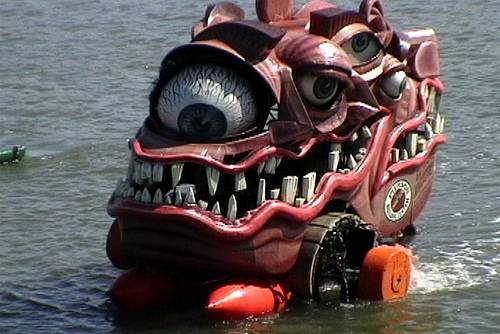Kamikaze planes had no landing gear.
“What Is This Sea Which Is All Round Me?”
“The next day I was sad and sick at heart, for I felt how dull it was to be thus cut off from all the rest of the world. I had no great wish for work: but there was too much to be done for me to dwell long on my sad lot. Each day as it came, I went off to the wreck to fetch more things; and I brought back as much as the raft would hold.”
— From Robinson Crusoe in Words of One Syllable by Mary Godolphin, 1869
Zorbing

New Zealanders know how to make their own fun. They’ve taken to rolling down hills inside giant plastic balls called zorbs. Most contain straps to hold the rider in place; if you’re insane you can forgo the straps and fill the ball with water, creating a self-contained water chute.
The first U.S. facility opens this year in Tennessee. Brace yourself.
Star Power
In 1993 Bruce Willis appeared in a Japanese advertising campaign for the Subaru Legacy, so the company designed a car in his honor.
It’s called the Subaru Touring Bruce.
Apple-Pie Archaeoastronomy

Drawn to megaliths but leery of foreigners? Then toss those plane tickets, drive to Hunt, Texas, and commune with Stonehenge II, a replica made of adobe and wire mesh.
Just watch out for the fire ants.
Unquote
“I don’t see any God up here.” — Soviet cosmonaut Yuri Gagarin
No Place Like Home
Gibsonton, Fla., has the nation’s only post office with a counter for dwarves.
That’s because Gibsonton used to serve as a sideshow wintering town, where Percilla the Monkey Girl, the Anatomical Wonder, and other circus “freaks” could spend the off season. Siamese twin sisters ran a local fruit stand, and special zoning laws permitted residents to keep elephants and circus trailers on their front lawns. The school board meetings must have been memorable.
Road Warriors

If you think your commute is bad, check out the Kinetic Sculpture Race, held every Memorial Day weekend in Ferndale, Calif. In three days, participants must cover 42 miles of mud, sand, water, gravel and pavement in vehicles powered only by people (“and friendly extraterrestrials”). Arrows, anchors and grappling hooks are strictly disallowed.
The race’s slogan is “adults having fun so children want to get older.”
Does This Count as Plagiarism?
Published in 1838, Edgar Allan Poe’s novel The Narrative of Arthur Gordon Pym of Nantucket tells of four men who survive a shipwreck. Starving, they draw lots to see which one is to be eaten. The loser is a man named Richard Parker.
Forty-six years later, in 1884, a yacht named the Mignonette sank during a journey from England to Australia. Four survivors were stranded in a dinghy. After 16 days, Captain Dudley and his two mates killed and ate the cabin boy–whose name was Richard Parker.
The three eventually returned to England, where they were convicted of murder.
Sports Illustrated Cover Jinx
You’d think it would be an honor to appear on a magazine cover, but at Sports Illustrated it’s a curse. Braves third baseman Eddie Mathews appeared on the magazine’s very first issue, then suffered a hand injury a week later and missed seven games. Here’s what happened to other cover subjects:
- Jan. 31, 1955: Skier Jill Kinmont hit a tree and was paralyzed from the neck down.
- Nov. 18, 1957: After the headline “Why Oklahoma Is Unbeatable,” the Sooners immediately lost to Notre Dame.
- May 26, 1958: Formula One driver Pat O’Connor was killed in a 15-car pileup.
- Feb. 13, 1961: Figure skater Laurence Owen died in a plane crash.
- Dec. 14, 1970: The University of Texas fumbled nine times against Notre Dame, losing the Cotton Bowl.
- April 6, 1987: “Believe it! Cleveland is the best team in the American League!” The Indians lost 101 games that year.
- Sept. 4, 1989: Baseball Commissioner Bart Giamatti’s words about Pete Rose appeared on the cover; days later, Giamatti died of a heart attack.
- June 5, 1995: Giants third baseman Matt Williams broke his foot and missed two and a half months.
The magazine acknowledged the jinx by putting a black cat on a 2002 issue. Rams quarterback Kurt Warner refused to pose with the cat — and the Rams won their next two games and their second consecutive NFC championship.
